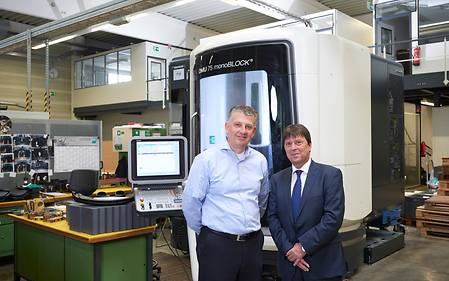Guaranteed productivity due to service agreements
Thanks to preventative maintenance and speedy service assignments by DMG MORI Service, Licharz benefits from a high level of machine availability
With sites in Germany, France and the UK, Licharz GmbH has evolved to become a reputable supplier of semi-finished products made of technical plastics since being established in 1962. At its headquarters in Bucholz, Germany, the company with a total of 260 employees produces components amongst others for mechanical and systems engineering and the construction machinery industry. Machining of high quality plastics requires reliable and powerful machining technologies, which is why Licharz places its trust in CNC solutions from DMG MORI. The required machine availability is ensured by DMG MORI Service, with whom the long-standing customer has reached concrete service agreements, stipulating the maintenance intervals, response times and provision of spare parts.
“Components made of high-performance plastics today are often a viable alternative to conventional metal components”, says Alfred Licharz, explaining the starting position for the positive business development of his company. There are enough applications to choose from: “The rope pulleys of construction cranes for example are often made of plastic, as this goes easy on the steel cables on the one hand and significantly reduces weight on the other.” Due to the stable plastics, durability is also no issue here.
The high component quality at Licharz goes back to the long-standing experience with the entire process chain. “We receive the still liquid raw material heated up to 80°C, polymerise it to semi-finished products or monocast parts, and thus cover the entire vertical integration from semi-finished product to the final construction part”, says Alfred Licharz. He regards chip removal as a crucial station. Its proportion in the value-added chain is approx. 40 percent. Around 100 employees work in this area alone in two shifts. The Technical Director explains the high standard: “The plastics are very robust in part, so that we load the machines and tools as much as we would do for the processing of metals.” For this reason, Licharz has largely been using CNC machines from DMG MORI for the past 15 years. Among most recent acquisitions were a DMF 260 and a DMU 75 monoBLOCK.
The machinery at Licharz is very diverse to meet the demands of each component. As the complexity of the customer-specific structural parts can be very high, 5-axis technologies have been a standard feature for many years. “The size of the products also varies with up to 3,000 x 1,000 mm, which also requires suitable machines”, Alfred Licharz adds. The large machine portfolio of the manufacturer almost always provides the right solution here. Another reason for the high proportion of DMG MORI models is the uniform control philosophy. “For example, a machining technician can equally work at each machining centre as required.” This is the most viable solution in the daily work routine in view of the shortage of skilled staff.
Reliable service enables predictability
The high demands placed on CNC technology are associated with respective expectations of reliability. Alfred Licharz comments: “We must optimally use our machines to capacity in order to remain productive and competitive.” Consequently, any downtime must swiftly be resolved. “Better still, this situation does not arise in the first place.” As machine supplier, DMG MORI is also responsible for the service at Licharz. In order for this to run smoothly, there are concrete service agreements defining regular maintenance, response times in case of damage as well as the provision of spare parts.
“The clearly defined service agreements provide us with some predictability”, says Alfred Licharz. For example, the service technician – in this case, DMG MORI Hilden, which is about one hour away, would be responsible – would be on site within 24 hours in case of a standstill through no fault of our own. The same deadline applies to spare part deliveries. The maintenance intervals depend on the machine type. “We report the respective operating hours, which is then used to organise maintenance.” Alfred Licharz sees maintenance as preventative measure with a view to high machine availability: “A machining centre which is maintained regularly will operate much more reliably in the long term”.
The reliability of the machines and the satisfaction with the service provide good reasons for Alfred Licharz to continue purchasing CNC technology from DMG MORI. He regards such acquisitions as investment into the future: “After ten years, we usually replace machines, as we can machine more innovative products more efficiently with modern production.”




